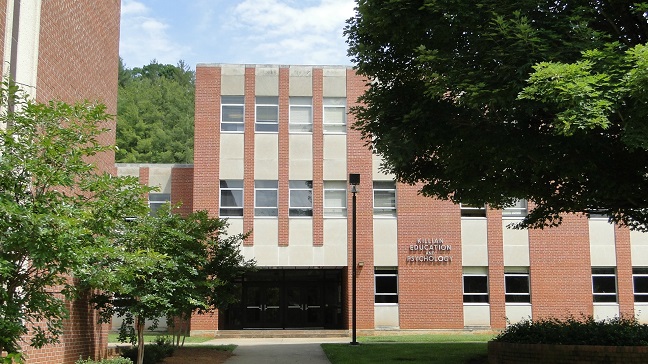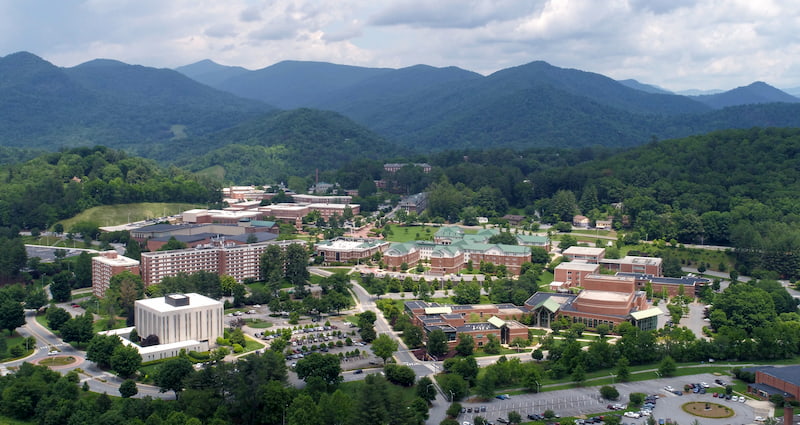- Academic Programs & Support
- Departments, Schools & Colleges
- College of Education and Allied Professions
- College Resources and Governance
- News
- The History of Psychology at WCU
The History of Psychology at WCU
By Bruce B. Henderson, Professor of Psychology
Psychology without a couch? Psychology with statistics, research methods, data and the brain? Welcome to the undergraduate psychology major at Western Carolina University where psychology is taught as a science. Our aim is to help students learn to think critically and to base decisions on evidence. These are skills that are useful in dealing with people in a wide variety of settings.
Psychology has been taught in Cullowhee from early in the twentieth century. However, students at WCU could not major in psychology until the 1960s. Cecil W. Mann, who had retired from Tulane University, was convinced to design and execute the major along with a few faculty members who were teaching educational psychology courses. Our undergraduate program has grown in recent years, to over 500 majors. We anticipate that it will continue to grow.
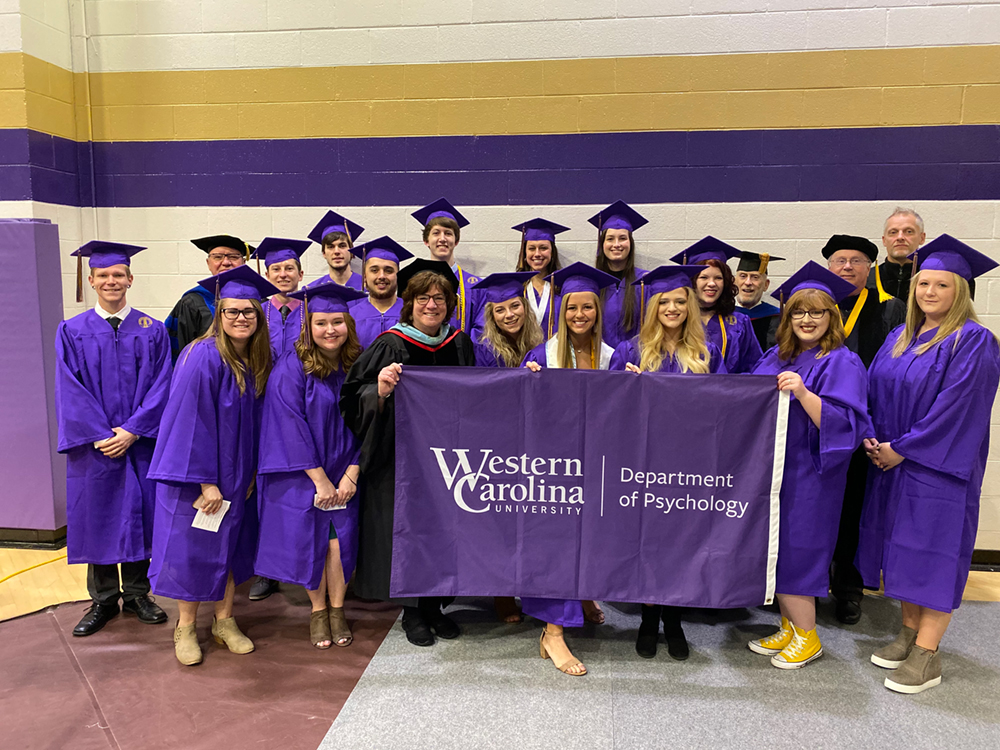
Psychology graduates at commencement December, 2019
What do psychology majors study?
All psychology majors take a core of courses in the science of psychology. The core includes work in statistics and research methodology, neuroscience (including human neuropsychology and psychopharmacology), learning and cognition, social and personality psychology, applications of psychology, and development. Every student learns about the history of the field. During their senior year, majors participate in a small seminar designed to pull their varied experiences together and to demonstrate what they have learned throughout the major.
Growth in the number of majors has limited the department’s ability to offer specialized courses, but faculty members have developed new courses that reflect their own research interests and have proved very popular with students. These include Dr. Tom Ford’s psychology of humor, Dr. Matt Meier’s psychology of weird things, Dr. Ethan Schilling’s introduction to school psychology, and Dr. Windy Gordon’s sport psychology. Dr. Ellen Sigler offers a course on the psychology of disability in which students have frequent contact with adults with disabilities.
Research experience: Doing new science
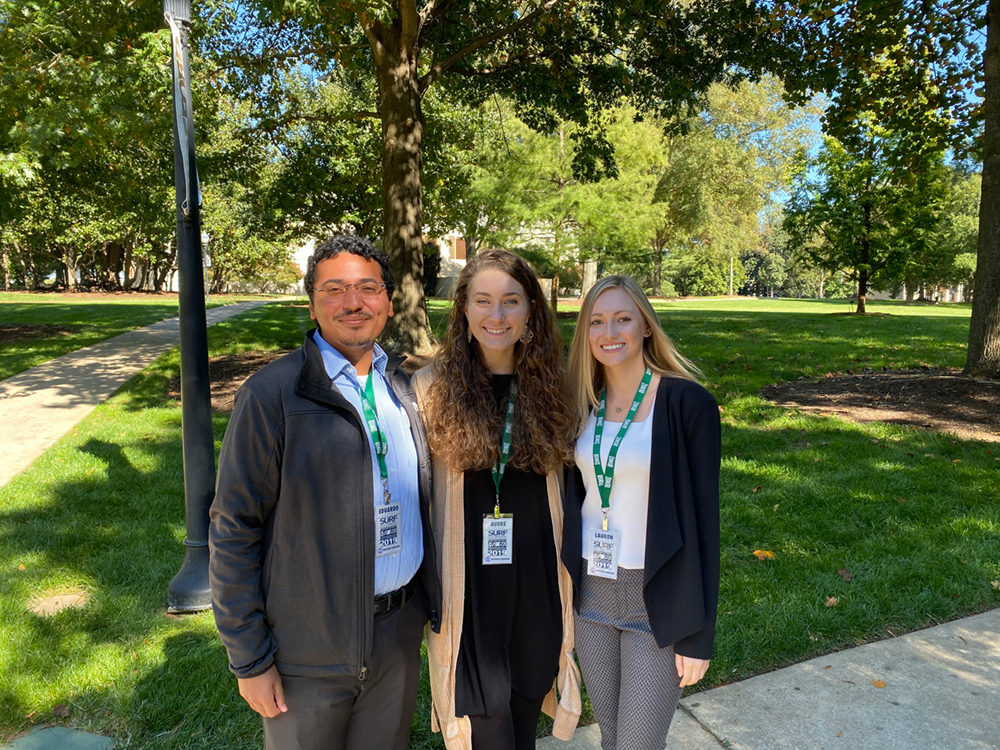
Eduardo Correa, Audre Tyner and Lauren Testerman at the 2019 SoCon Undergraduate Research Program meeting at Wofford College
A high-impact educational practice many psychology majors engage in is research with faculty members and graduate students. Typically, undergraduates will begin their research careers by apprenticing with a team of faculty members and graduate students. They may initially be involved as assistants but most move onto designing projects of their own. This process leads many students to professional research conferences where they present their work in scholarly papers. For several years Western has taken more than 30 undergraduates to the annual Southeastern Psychological Association (SEPA) meeting. This year, senior Lauren Testerman’s paper is a finalist for SEPA’s Committee on Equality of Professional Opportunity award.
Matthew Dodge, WCU’s first engineering-psychology double major, has been working with David McCord on a Spanish language version of a new multidimensional behavioral health screening test. Matthew obtained a summer research grant that allowed him to gather data at a medical clinic for Spanish families and at a local restaurant that is a gathering place for Latinx families and workers. Matthew also completed a study of a new sleep quality measuring instrument and how sleep quality relates to the personality. He presented the findings at a meeting of elite Minnesota Multiphasic Personality Instrument (MMPI) researchers in Minneapolis. Matthew graduated in December, but continues to work on the research and plans to continue his research in a doctoral program.
Internships: Connecting the science with applications
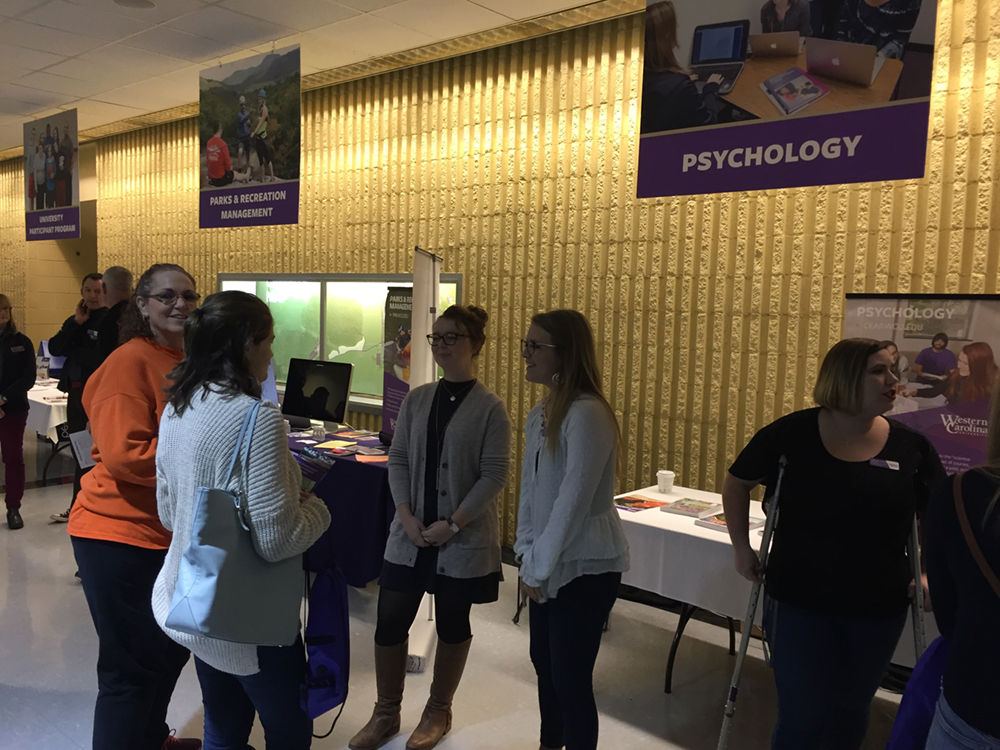
Psychology Ambassadors (l to r) Madison Surrett, Rebecca Peterson and Stephanie Powell at an Admissions Open House
Although undergraduate psychology majors are not required to do an internship, many do, either during the summer or the school year. Mickey Randolph has developed relationships with many agencies and programs and students themselves often identify new opportunities. Students have completed internships locally, regionally, and even internationally. Dr. Randolph has developed an in-class experience that helps orient students to issues of ethics and practice and that requires them to reflect on their experiences and how they connect to their coursework.
An example of how internships work was described in a recent article about internships published in the Western Carolinian. Regan Waters worked with AWAKE Children’s Advocacy Center in Sylva. AWAKE serves abused children. Regan helped the agency develop a website that families could use to learn about the agency’s resources and services. Similarly, Brittany Crowley worked with the local Clean Slate organization, a residential program for women recovering from abuse. Brittany helped with community outreach and fund raising.
Several of our students have participated in the State Employees Credit Union (SECU) Public Fellows Internship. That program funds college students who exploring public service careers in rural areas of North Carolina.
What do you do with a degree in psychology?
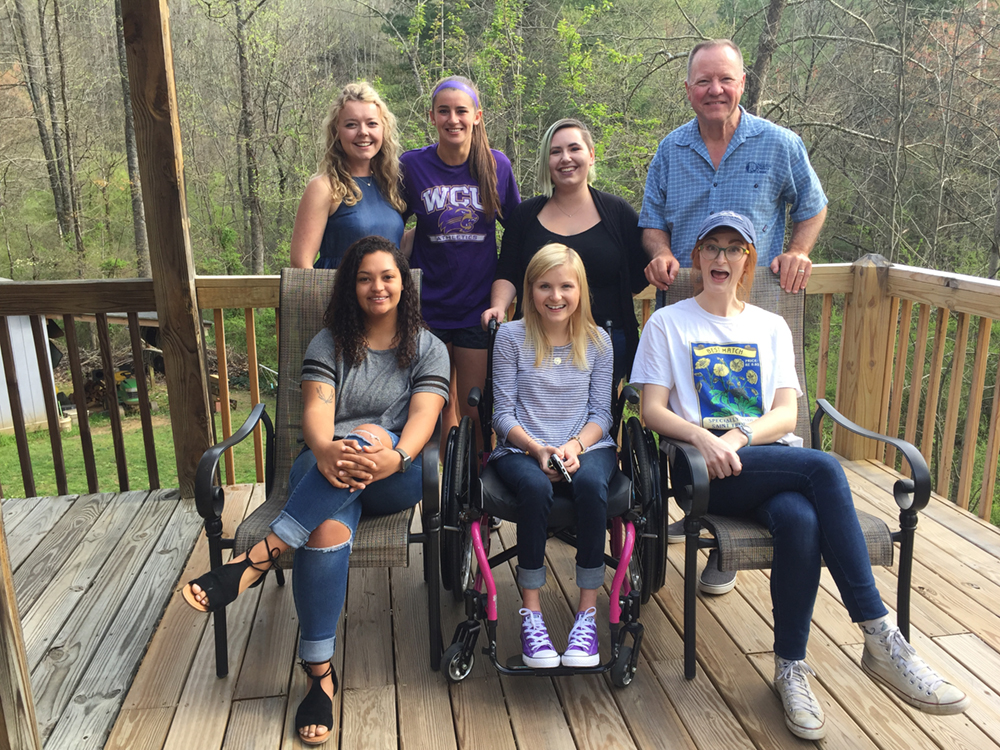
Psychology Ambassadors (front l to r) Jordan Ellinwood, Hayley Morris, Carolyn Nosworthy, (back l to r) Madison Surrett, Jacqui Gnassi, Stephanie Powell, Dr. Windy Gordon
What do students do with a degree in psychology? Perhaps most obviously, some go on to get graduate degrees in psychology. Those students become clinical psychologists who work in clinics, hospitals and private practice. Or they become school psychologists who work in schools. Or they become industrial-organizational psychologists who work in business and industry. Or they become academic psychologists and work in universities and research centers.
Most psychology majors, however, do not become professional psychologists with graduate degrees in psychology. Instead, they use the skills and knowledge they gain as psychology majors to go into other fields. In recent years, WCU psychology graduates became counselors, lawyers, physicians, nurses, physical therapists, occupational therapists, social workers, bankers, managers, college student life coordinators, group home coordinators, rehabilitation specialists, caseworkers, and health technicians. We also have an alum who is a successful country music artist and one who uses social psychological principles to train salespeople how to sell more cars.
Building community
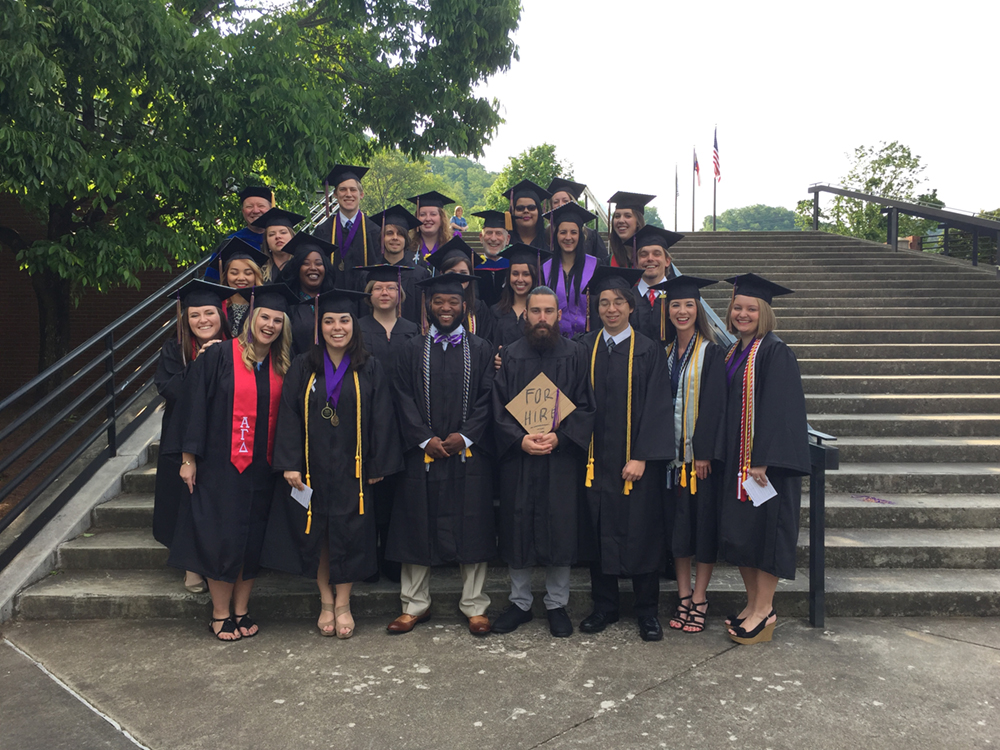
Psychology graduate at commencement, May 2016
Although we have many psychology majors, we get to know our students. In addition to their academic coursework, internships, and research, students have opportunities to interact with each other in the Cecil Mann Psychology Club and the local chapter of the psychology honorary Psi Chi (featured in the last issue of CEAP News). WCU’s Psi Chi, sponsored by faculty member David Scales, is celebrating its 50th anniversary this year. Our best students become Psychology Ambassadors. They help faculty in recruiting, Open Houses, and meet with job candidates.
Undergraduate students also participate in the department’s colloquium series on Wednesday afternoons. Scholars from other psychology departments in the region provide lectures on their research. This year our students heard from three major visiting scholars, including the former cartoon editor of the New Yorker (who did graduate work in experimental psychology), an internationally known expert on the psychology of suicide, and one of the most prominent clinical psychologists in the country.
Role and mission
When I joined the psychology faculty 42 years ago, there were three small graduate programs and about 80 majors. Most of the department’s teaching was service to the general education and teacher preparation programs. Today, while we still serve the university and region through liberal studies teaching and graduate teaching and research, the undergraduate major is at the core of our mission and identity. WCU is a great place to get an undergraduate degree in psychology with breadth and depth, one that provides knowledge and skills that benefits students in work and life.
